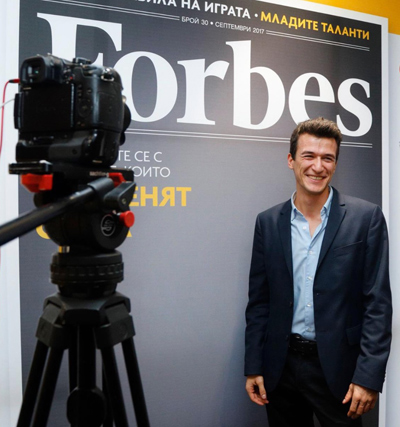A young Bulgarian decided that he liked the idea of a better world through social entrepreneurship, helping people to solve their issues and make a career. For eighteen months now Alexander Naydenov has been making easier the scientific communication between those who know and those who seek knowledge in the different parts of the world.
 Alexander is the co-founder of the PaperHive platform, following the idea of German Andre Gaul for the creation of software that helps scientists and students to read together and comment complicated texts. The platform’s activities didn’t remain unnoticed and the Forbes listed them in their ranking of Top 30 most successful social entrepreneurs in Europe.
Alexander is the co-founder of the PaperHive platform, following the idea of German Andre Gaul for the creation of software that helps scientists and students to read together and comment complicated texts. The platform’s activities didn’t remain unnoticed and the Forbes listed them in their ranking of Top 30 most successful social entrepreneurs in Europe.
“Social entrepreneurship is about the concept that good intentions are not enough for a project, but entrepreneur business approach is also necessary,” Alexander explains. “This means that it is not enough to just raise funds through a foundation or apply for European funding. Actual results are what matters most – the number of people that received help, the improved life of those people through better health and education, higher salaries… In other words social entrepreneurship means to get proficient in doing good.”
The 27-year-old entrepreneur points at other different and positive initiatives in Bulgaria: ”Together in Class”, preparing young teachers for problematic regions with lack of tutors and funding, and “Treatment without Borders” intended to help for free with interpreting at medical consultations and with finding accommodation for the families of sick Bulgarians treated abroad. Prior to his leaving for Germany, where he graduated in economics, Alexander was part of the United Ideas for Bulgaria NGO and assisted to entrepreneur-spirited people to start their own business.
The second part of Alexander’s dream was to work for the UN after his graduation in economics, but he managed to achieve only the graduating part. He doesn’t regret it at all, because in his words he has found something much more meaningful for himself – to connect the scientific community globally, assisting in exchanging and interpreting the information in the respective sphere. However, the books and articles cannot be found with PaperHive, but on the websites of the publishing houses that the company works with.
“Bulgarian publishers haven’t shown great interest so far, to some extent due to the fact of the few academic publishing houses here, but it is a matter of time,” Alexander explains. “Academic online publishing has already become a standard worldwide and there are development options for Bulgaria as well. I hope that soon we will start our cooperation with Bulgarian publishers and universities.”
PaperHive has been used in over 60 countries for the time of its existence so far and there are more than 1.7 mln. articles available in there.
“It is interesting to observe how people who have probably never set their foot in the other person’s country develop science together,” Alexander further comments. “People who know the answer to the questions of students – the professors also use the platform to save time: instead of answering to hundreds of emails every month they do this directly on the textbooks.”
Which is the next major goal for PaperHive?
“The next big market for us is in the sphere of scientific groups and universities,” Alexander says. “That is we will be looking for even closer contact with universities, in order for a growing number of professors to start using the platform as a tool in their lectures. This has already been happening with literature, which is in our system, but we would like to see it everywhere.”
English version: Zhivko Stanchev
In the next 12 months, the Bulgarian business needs about 262,000 workers and specialists , according to a study by the Employment Agency. This is nearly 9.3% of the currently employed. Compared to the results in 2023, there is a..
There will be pilot testing of ground-based silver iodide generators for hail protection in two zones where the use of rockets is not allowed, the Deputy Minister of Agriculture Ivan Kapitanov said. At a meeting with Claude Berthet,..
The German economy has been shrinking and the government expects a decline of 0.2% of GDP. Some of the main reasons for this include unresolved structural problems related to lack of energy security, excessive bureaucracy and shortage..

+359 2 9336 661
